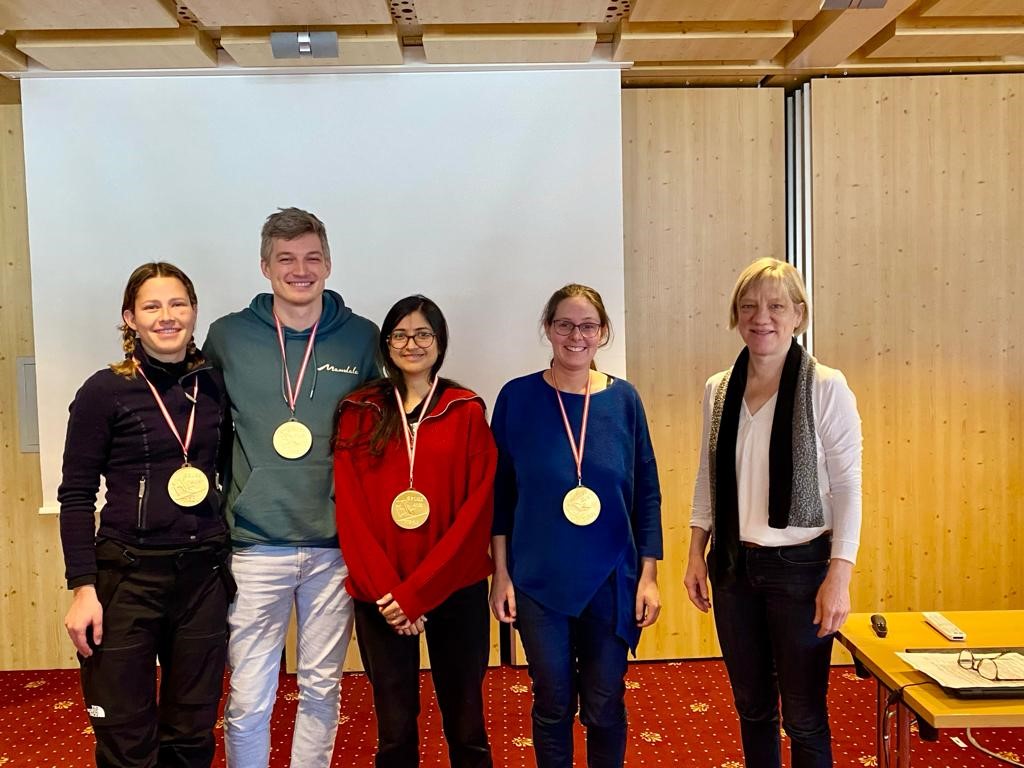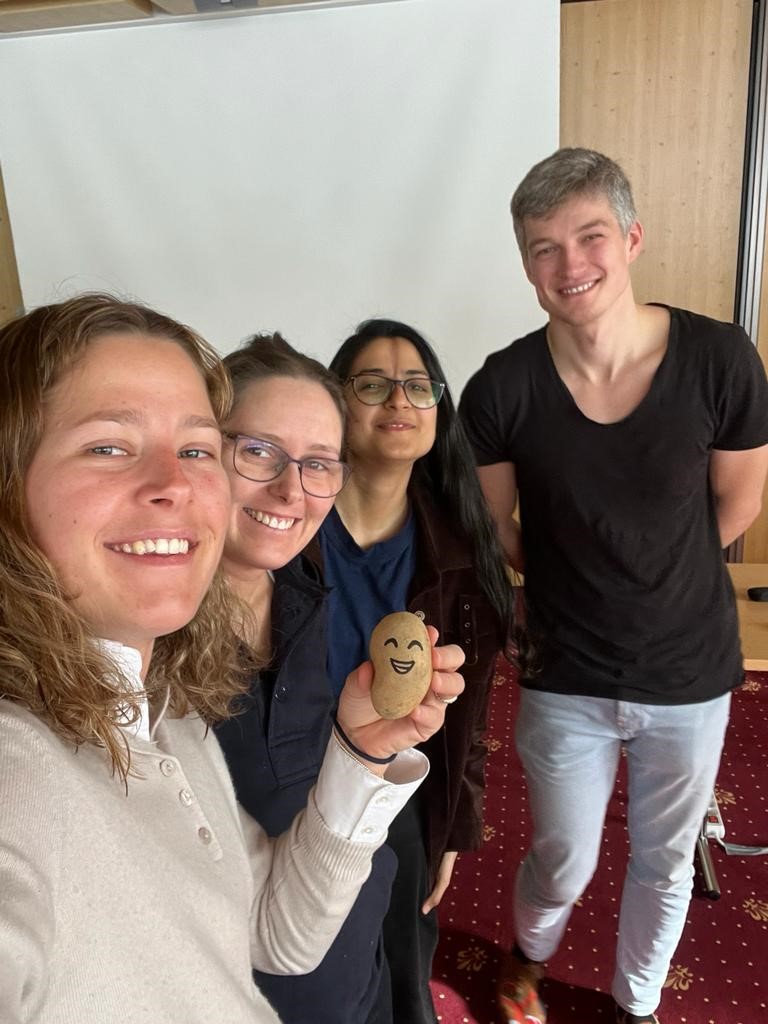Planar Carbon Lattices
RTG-2861-PCL
December 2024 joint RTG-PCL & CRC 1415 guest seminar and X-mas get-together
- Guest speaker: Jun.-Prof. Frederik Haase, Uni Halle
- Talk title: "Inducing and Reducing Polymorphism in Covalent Organic Frameworks"
- Date: Thursday, 12th December 2024
- Schedule
14:40 - 15:00 Welcoming coffee
15:00 - 16:00 Guest talk
16:00 - 17:30 X-mas party - Location: CHE/182, TU Dresden and online
November 2024 joint scientific meeting
7th on-site scientific meeting, with TUD research group traveling to Erlangen and staying overnight. Includes one afternoon and one morning session.
- November 14-15, 2024 in Erlangen
- Time: 12:30-18:00 on Thu and 9:00-12:30 on Fri
- Guest speaker: Prof. Dr. Thomas Bein, University of Munich (LMU)
- Location: FAU, Südgelände, Seminar room 13301.00.111 (Chemikum Organische Chemie), Nikolaus-Fiebiger-Str. 10
- Location & Accommodation Details
- Meeting Program
September 2024 RTG2861-PCL Summer School 2024 "Properties and Functions of PCL"
- Dates: Sep 23-27, 2024
- Location: NH Prague City, Mozartova 261/1, 15000 Prague - Czech Republic
- Invited speakers:
Dr. Otakar Frank, J. Heyrovský Institute of Physical Chemistry, CAS
Dr. Pavel Jelinek, Nanosurf Lab, Institute of Physics, CAS
Dr. Pascal Ruffieux, EMPA, Carbon Materials
- Extended program
July 2024 RTG-PCL invited talk
- Guest speaker: Prof. Yu Jing, Nanjing Forestry University, China
- Talk title: "Rational design of carbonyl organic materials for lithium ion batteries"
- Date and time: Tuesday, 30th July 2024, 13:00 CET
- Location: HSZ/E01/U, TU Dresden and online
July 2024 Women in Science-3rd Erlangen Symposium
- July 22-24, 2024 in Erlangen
- Location: Department of Chemistry and Pharmacy at Friedrich-Alexander-Universität Erlangen-Nürnberg
- Conference website
- Conference poster
RTG-PCL doctoral researchers at the symposium

July 2024 RTG-PCL invited talk
- Guest speaker: Prof. Julio Chacon, Yacchai Tech University, Ecuador
- Talk title: "Understanding structural changes in carbon nananostructures by Raman and XPS spectroscopy"
- Date and time: Wednesday, 10th July 2024, 14:00 (2:00 pm)
- Location: Physikum, HF (Hörsaal/lecture hall F), Staudtstr. 5-7, Erlangen and online
May 2024 joint scientific meeting
6th on-site scientific meeting, with TUD research group traveling to Erlangen and staying overnight. Includes one afternoon and one morning session.
- May 16-17, 2024 in Erlangen
- Time: 12:30-18:00 on Thu and 9:30-13:30 on Fri
- Guest speaker: Prof. Jong-Beom Baek, CDCOF, UNIST, Korea
- Location and Program
April 2024 joint scientific meeting
5th on-site scientific meeting, with FAU research group traveling to Dresden and staying overnight. Includes one afternoon and one morning session.
- April 18-19, 2024 in Dresden
- Time: 12:30-18:00 on Thu and 9:30-13:30 on Fri
- Guest speaker: Dr. Deborah Prezzi, CNR-Nanoscience Institute, Modena, Italy
- Location and Program
Impressions

April 2024 BeWISE 2024 - Women in Science and Engineering - Conference for female young scientists
- April 15-17, 2024 in Dresden
- Location: Pullman Hotel, Prager Str. 2c, 01069 Dresden
- Conference website
January 2024 GSMS Winter School 2024, with participation of the RTG-PCL doctoral researchers
- January 22-26, 2024 in Kirchberg in Tirol
- Location: Hotel Sonnalp, Familie Mayer, Almweg 22, A 6365 Kirchberg in Tirol
- Registration closes on November 30, 2023 at 5:00 p.m.
- Detailed Program
The winners of the RTG-PCL Hobby Project Competition
The research proposal project competition of RTG2861-PCL was unveiled during this year's GSMS winter school in Kirchberg. Since the RTG2861 Summer School, students collaborated in interdisciplinary groups to develop innovative proposals aligned with the DFG guidelines for a 3-year PhD project, to be presented within a 20-minute timeframe. The victorious team for this year comprises of Jannis Kockläuner (AK Golze, TUD), Shreya Garg (AK Maier, FAU), Elena Mack (AK Guldi, FAU), Aleena Jose (AK Kaskel, TUD), and Britta Maib (AK Maultzsch, FAU) who spearheaded the project titled "Let’s Save The Potatoes!" or "Deep Learning Strategies for Raman Spectroscopy based Plant Disease Detection".
The proposal centers on bridging the current gap between recent developments in the application of Raman techniques for analytical purposes and deep learning techniques. By building a Raman spectra database specifically dedicated to the flagship application of plant disease detection, the project aims to act as a bridge between two previously disconnected fields of research.
While various image databases, such as the Plant Village Dataset, have been combined with deep learning for symptomatic plant disease detection, Raman spectroscopy offers a promising alternative especially with focus on early detection during the asymptomatic stage. The ultimate objective is to demonstrate the applicability of anomaly detection techniques, introducing a new paradigm for the automated analysis of spectra which is solely based on healthy samples.
The winning team, composed of students with diverse backgrounds in Physical Chemistry, Theoretical Chemistry, Inorganic Chemistry, and Experimental Physics, underscores the collaborative ethos of RTG2861-PCL, promoting interdisciplinary engagements. Well done!


